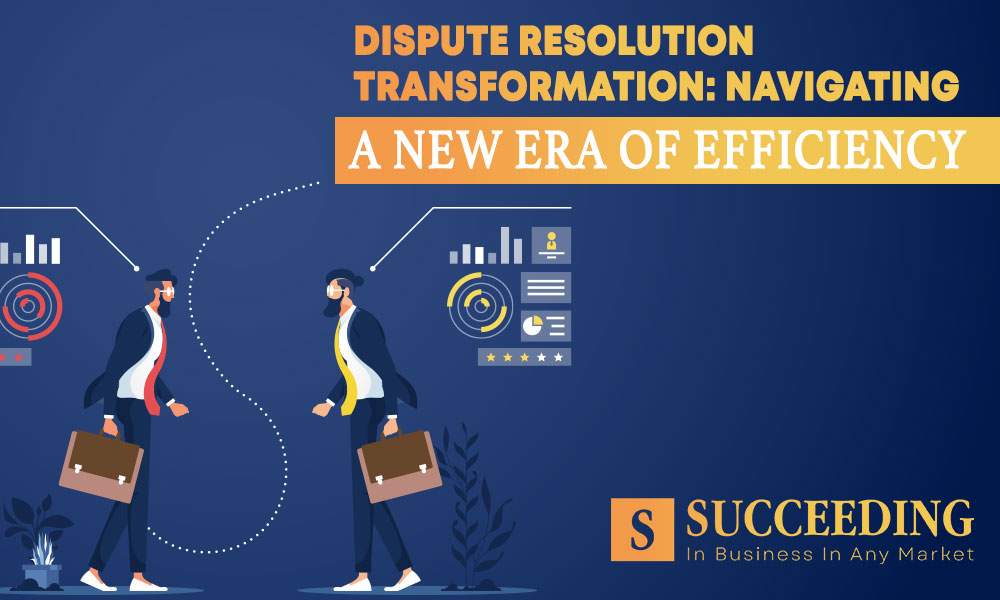Post Date: May 6, 2024

In the intricate tapestry of business interactions, disputes are an inevitable aspect that can disrupt the harmony of operations. The efficiency with which these disputes are resolved plays a pivotal role in maintaining organizational equilibrium. This article delves into the world of dispute resolution, shedding light on the challenges posed by traditional methods and the transformative journey businesses are undertaking to enhance efficiency. The focal point of this exploration lies in the synergy between “Dispute Resolution” and “Efficiency.”
1: The Landscape of Dispute Resolution
The current landscape of dispute resolution is marked by traditional methods that, despite their long-standing presence, often fall short in addressing the needs of contemporary businesses. The intricate nature of disputes, coupled with the globalized nature of transactions, presents challenges that demand a reevaluation of existing resolution methods. Prolonged disputes can have far-reaching consequences on relationships, productivity, and the overall health of an organization.
2: The Need for Transformation in Dispute Resolution
The need for a transformation in dispute resolution arises from the limitations of traditional approaches in coping with the evolving business landscape. As transactions become more complex and global, the stakes in dispute resolution are higher than ever. Case studies illustrate the real-world consequences of inefficient dispute resolution, emphasizing the imperative for businesses to adapt and transform their approaches.
3: Emerging Technologies in Dispute Resolution
Technology stands at the forefront of this transformation, offering innovative solutions to age-old problems. Online platforms, artificial intelligence (AI), and data analytics are reshaping the dispute resolution landscape. By streamlining and expediting resolution processes, technology is becoming a powerful ally in the quest for efficiency. Real-world examples highlight how businesses are leveraging technology to revolutionize their dispute-resolution strategies.
4: Online Dispute Resolution (ODR): A Game-Changer
Among the technological advancements, Online Dispute Resolution (ODR) emerges as a game-changer. ODR platforms facilitate remote resolution, reducing time lags and offering cost-effective alternatives to traditional methods. Case studies demonstrate instances where ODR has not only expedited resolution but has also provided businesses with a flexible and accessible means of resolving disputes.
5: The Role of Artificial Intelligence in Dispute Resolution
Artificial intelligence adds another layer to the efficiency equation in dispute resolution. AI-driven analytics can predict potential disputes, analyze patterns, and recommend optimal resolution strategies. This section explores how AI contributes to faster and more accurate decision-making, ultimately enhancing the efficiency of dispute-resolution processes.
6: Best Practices for Efficient Dispute Resolution
For businesses contemplating a transformation in dispute resolution, the adoption of best practices is paramount. Clear dispute resolution policies, comprehensive employee training, and ongoing evaluation are key components. Case studies further illustrate the successful implementation of best practices, providing a roadmap for organizations looking to enhance the efficiency of their dispute resolution processes.
7: Cultural and Organizational Shifts in Dispute Resolution
Beyond technology, fostering a culture of proactive dispute resolution within organizations is crucial. Leadership plays a pivotal role in promoting a mindset shift towards efficiency and collaboration. This section explores how organizational structures and communication strategies contribute to a more streamlined dispute resolution process, emphasizing the importance of a holistic approach.
8: Legal Considerations and Compliance in Dispute Resolution Transformation
As businesses embark on the journey of dispute resolution transformation, legal considerations and compliance must not be overlooked. Aligning transformed processes with legal frameworks and industry regulations is imperative. Insights into ensuring legal compliance while enhancing efficiency in dispute resolution are provided in this section.
9: The Future of Dispute Resolution Transformation
The future of dispute resolution holds exciting possibilities. Emerging trends, innovations, and global shifts are set to shape the landscape further. This section discusses the potential impact of evolving technologies, regulatory changes, and global dynamics on how businesses approach dispute resolution. It serves as a call to action for organizations to stay agile and proactive in embracing ongoing transformation.

Conclusion:
In conclusion, the transformation of dispute resolution is not merely a response to challenges; it is a strategic evolution aimed at ensuring the continued success and harmony of businesses. The symbiosis of technology, cultural shifts, and legal considerations forms the foundation for a new era of efficiency in dispute resolution.
FAQs:
Q1: Why is dispute resolution efficiency important for businesses?
A1: Efficient dispute resolution is crucial for maintaining organizational equilibrium, preserving relationships, and sustaining productivity. It ensures that businesses can navigate challenges swiftly and effectively.
Q2: How does technology contribute to dispute resolution efficiency?
A2: Technology, including Online Dispute Resolution (ODR) and artificial intelligence, streamlines processes, reduces time lags, and offers cost-effective alternatives. It enhances decision-making and transforms dispute resolution from a traditional to a tech-driven, efficient process.
Q3: What are some best practices for efficient dispute resolution?
A3: Best practices include having clear dispute resolution policies, comprehensive employee training, and regular evaluations. These practices create a foundation for efficient resolution processes within organizations.
Q4: How does legal compliance factor into dispute resolution transformation?
A4: Legal compliance is crucial in dispute resolution transformation. Aligning transformed processes with legal frameworks ensures that businesses not only enhance efficiency but also operate within the boundaries of the law, mitigating risks associated with disputes.





